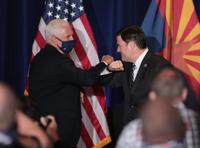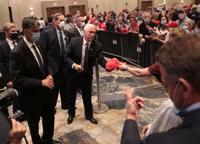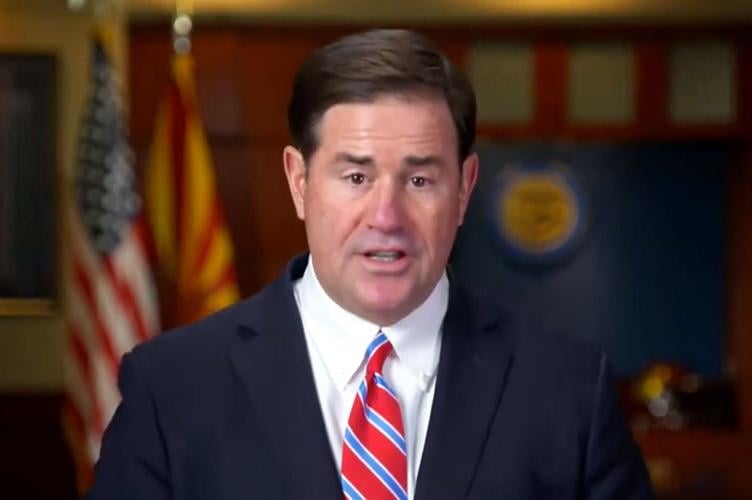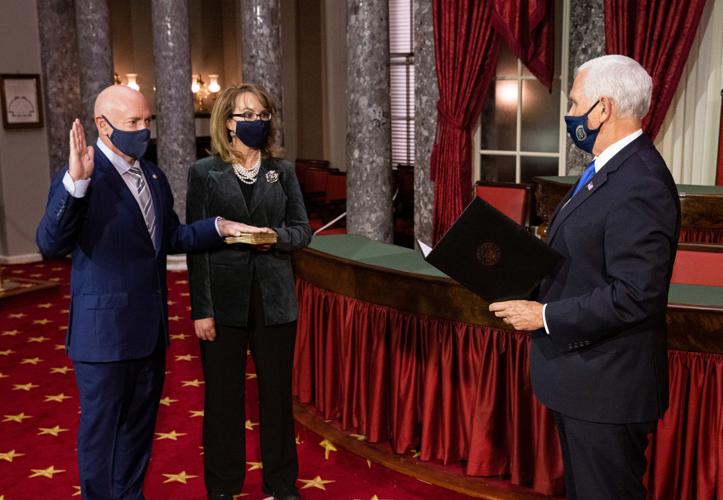PHOENIX — Arizona Republicans will have to have to look for someone new — with name recognition or access to cash — to run against Mark Kelly for U.S. Senate in 2022.
“The governor has said specifically he is not running for the United States Senate,” said C.J. Karamargin on Sunday for Gov. Doug Ducey.
Ducey met with Mitch McConnell, then Senate majority leader, when he was in Washington last week for the inauguration of President Biden. McConnell helped to raise money for Martha McSally’s bid to hang on to the U.S. Senate seat Ducey gave her in 2018. But Karamargin said the governor was chatting with McConnell about federal issues, including COVID-19.
Ducey, who will be only 58 when he leaves office, cannot legally seek a third term as governor.
Pollster Mike Noble of OH Predictive Insights said the governor’s decision creates a problem for Republicans in finding someone to run against Kelly.
The former astronaut performed quite well in November, actually gathering more votes than Joe Biden in nominally Republican Arizona.
And then there’s the money.
Kelly managed to raise nearly $100 million in his bid to finish the last two years of the term that originally belonged to John McCain, besting the $71 million that McSally put together even with McConnell’s help. And as an incumbent he may have even more advantage.
Arizona Gov. Doug Ducey comments on Arizona Sen. John McCain during a press conference in Tucson on Aug. 24, 2018, after the McCain family announced the Senator will no longer be treated for brain cancer. Video by Rick Wiley / Arizona Daily Star
“I don’t know, outside of Ducey, who in the state that kind of is positioned with the ability to raise the type of funds needed for the U.S. Senate seat here,” Noble said.
And if not Ducey?
“It’s kind of a thin bench for the GOP,” Noble said.
Some elected Republicans with a high profile might see the race as an opportunity.
One is Attorney General Mark Brnovich.
Like Ducey, he cannot run for a third term in 2022. That makes him a potential choice not only for the Senate seat but for the open gubernatorial post.
On Sunday, Brnovich brushed aside questions of his political future.
“I’m too busy watching the Packers game, enjoying a beer and a brat with my wife’s family, to think about the Senate or anything else political,” he said.
Treasurer Kimberly Yee, the other statewide elected Republican, also could be a contender. In fact, she got more votes in 2018 than Brnovich.
Noble said that Kelli Ward, fresh off a narrow victory to retain her slot as chair of the Arizona Republican Party, also might see an opportunity even though she has waged two prior unsuccessful bids for the U.S. Senate.
Ward did not return calls seeking comment.
Then there’s the state’s congressional delegation.
Andy Biggs and Paul Gosar both have cruised to easy victories in their GOP-dominated congressional districts. But both, like Ward, are firmly in the Trump wing of the party, which may pose a challlenge in a statewide race where they would need broad support.
More moderate is David Schweikert, whose background includes both time in the Arizona Legislature and as Maricopa County Treasurer. But Schweikert said he sees no reason to give up what may be a safe seat in the U.S. House.
“I’m probably an election cycle away from getting at least a subcommittee in Ways and Means,” he told Capitol Media Services.
That powerful committee is in charge of crafting tax legislation. And much of the detail is worked out at the subcommittee level.
“In the old days, people use to wait 25 years just to get one of those,” Schweikert said. “And it’s what I like doing.”
And there’s something else.
“My vanity is not out of control right now,” he quipped.
With money likely to be an issue in the 2022 race, Noble said the party might do well to look for someone with deep pockets or access to money through the business community.
One option, he said, is Karin Taylor Robson, appointed by Ducey to the Arizona Board of Regents in 2017.
An attorney experienced in issues of land use, development and zoning, Taylor Robson is the founder and president of Arizona Strategies, a land-use strategy firm’ based in Phoenix. She also chairs the Joe Foss Institute, a Scottsdale nonprofit that lists its values as promoting among students the values of freedom, patriotism, integrity, service and character.
Glenn Hamer, president of the Arizona Chamber of Commerce and Industry, said he’s not as convinced as Noble that fundraising will be such a big deal. He said that in the 2020 race, the vast majority of donations to both Kelly and McSally came from small donors throughout the county.
“So once there’s a nominee, the dollars are very likely to flow in, no matter who the candidate is,” Hamer said.
State Senate President Karen Fann, a Prescott Republican, said one of the problems with handicapping the race for U.S. Senate is that there will be lots of posts open for statewide office.
“So this is truly going to be one of those musical chairs elections,” she said. And new district lines will be drawn before the 2022 race.
“That’s going to put some of our legislators in positions of deciding whether they’re going to run for their new, redrawn district or do they have aspirations to do something else, move on to Congress or Senate or a statewide office,” Fann said.
One other potential option, said Noble, is former Congressman Matt Salmon. He made one other statewide bid in the past when he narrowly lost to Janet Napolitano in 2002.
And Debbie Lesko, the other Republican member of the congressional delegation, has strong support among business interests.
Photos: Vice President Mike Pence in Tucson, Mesa in August
Mike Pence in Tucson

Vice President Mike Pence shakes hands with Arizona Police Association President Justin Harris at the Cops for Trump event held at The Westin La Paloma Resort & Spa located at 3800 E Sunrise Drive in Tucson, on Aug. 11, 2020. The APA formerly gave the Vice President their endorsement for President Donald J. Trump's re-election during the event.
Mike Pence in Tucson
Updated
Vice President Mike Pence at the Cops for Trump event held at The Westin La Paloma Resort & Spa located at 3800 E Sunrise Drive in Tucson, on Aug. 11, 2020.
Mike Pence in Tucson

Pinal County Sheriff Mark Lamb speaks before Vice President Mike Pence at the Cops for Trump event held at The Westin La Paloma Resort & Spa located at 3800 E Sunrise Drive in Tucson, on Aug. 11, 2020.
Mike Pence in Tucson

President Donald Trump supporters take photos in front of a monitor before Vice President Mike Pence took the stage at the Cops for Trump event held at The Westin La Paloma Resort & Spa located at 3800 E Sunrise Drive in Tucson, on Aug. 11, 2020.
Mike Pence in Tucson

Arizona Governor Doug Ducey speaks ahead of Vice President Mike Pence at the Cops for Trump event held at The Westin La Paloma Resort & Spa located at 3800 E Sunrise Drive in Tucson, on Aug. 11, 2020.
Mike Pence in Tucson

Senator Martha McSally speaks ahead of Vice President Mike Pence at the Cops for Trump event held at The Westin La Paloma Resort & Spa located at 3800 E Sunrise Drive in Tucson, on Aug. 11, 2020.
Mike Pence in Tucson

Senator Martha McSally speaks ahead of Vice President Mike Pence at the Cops for Trump event held at The Westin La Paloma Resort & Spa located at 3800 E Sunrise Drive in Tucson, on Aug. 11, 2020.
Mike Pence in Tucson

Pima County Sheriff Mark Napier listens to a constituent while waiting for the arrival of Vice President Mike Pence at the Cops for Trump event held at The Westin La Paloma Resort & Spa located at 3800 E Sunrise Drive in Tucson, on Aug. 11, 2020.
Mike Pence in Tucson

Vice President Mike Pence arrives at the Cops for Trump event held at The Westin La Paloma Resort & Spa located at 3800 E Sunrise Drive in Tucson, on Aug. 11, 2020.
Mike Pence in Tucson
Updated
Vice President Mike Pence at the Cops for Trump event held at The Westin La Paloma Resort & Spa located at 3800 E Sunrise Drive in Tucson, on Aug. 11, 2020.
Mike Pence in Tucson
Updated
Vice President Mike Pence at the Cops for Trump event held at The Westin La Paloma Resort & Spa located at 3800 E Sunrise Drive in Tucson, on Aug. 11, 2020.
Mike Pence in Tucson
Updated
Vice President Mike Pence arrives for a "Cops for Trump" event Tuesday, Aug. 11, 2020, in Tucson, Ariz. (AP Photo/Matt York) Photo by Josh Galemore / Arizona Daily Star
Mike Pence in Tucson
Updated
Vice President Mike Pence at the Cops for Trump event held at The Westin La Paloma Resort & Spa located at 3800 E Sunrise Drive in Tucson, on Aug. 11, 2020.
Mike Pence in Tucson
Updated
Vice President Mike Pence at the Cops for Trump event held at The Westin La Paloma Resort & Spa located at 3800 E Sunrise Drive in Tucson, on Aug. 11, 2020.
Mike Pence in Tucson
Updated
Vice President Mike Pence at the Cops for Trump event held at The Westin La Paloma Resort & Spa located at 3800 E Sunrise Drive in Tucson, on Aug. 11, 2020.
Mike Pence in Tucson
Updated
Vice President Mike Pence at the Cops for Trump event held at The Westin La Paloma Resort & Spa located at 3800 E Sunrise Drive in Tucson, on Aug. 11, 2020.
Mike Pence in Tucson
Updated
A Donald Trump supporter waits for Vice President Mike Pence to take the stage at the Cops for Trump event held at The Westin La Paloma Resort & Spa located at 3800 E Sunrise Drive in Tucson, on Aug. 11, 2020.
Mike Pence in Tucson
Updated
Vice President Mike Pence gives a thumbs up after speaking at a "Cops for Trump" event Tuesday, Aug. 11, 2020, in Tucson, Ariz. (AP Photo/Matt York) Photo by Josh Galemore / Arizona Daily Star
Mike Pence in Mesa

Vice President Mike Pence speaks to supporters at a "Latter-day Saints for Trump" campaign event in Mesa, Ariz. August 11, 2020. It was his second stop in the battle ground state after visiting Tucson earlier in the day.
Mike Pence in Mesa

Vice President Mike Pence is greeted by Ariz. Gov. Doug Ducey before speaking to supporters at a "Latter-day Saints for Trump" campaign event in Mesa, Ariz. August 11, 2020. It was his second stop in the battle ground state after visiting Tucson earlier in the day.
Mike Pence in Mesa

Vice President Mike Pence speaks to supporters at a "Latter-day Saints for Trump" campaign event in Mesa, Ariz. August 11, 2020. It was his second stop in the battle ground state after visiting Tucson earlier in the day.
Mike Pence in Mesa

Vice President Mike Pence signs a hat for a supporter at a "Latter-day Saints for Trump" campaign event in Mesa, Ariz. August 11, 2020. It was his second stop in the battle ground state after visiting Tucson earlier in the day.
Mike Pence in Mesa

Vice President Mike Pence speaks to supporters at a "Latter-day Saints for Trump" campaign event in Mesa, Ariz. August 11, 2020. It was his second stop in the battle ground state after visiting Tucson earlier in the day.
Mike Pence in Tucson
Updated
Donald Trump supporter Jackie Harms holds two flags as Vice President Mike Pence drives by on E. Sunrise Dr., in Tucson, Ariz. on August 10, 2020. Vice President Mike Pence spoke at a "Cops for Trump" campaign stop at Westin La Paloma Resort and Spa.
Mike Pence in Tucson
Updated
A Donald Trump supporter holds a flag while waiting for Vice President Mike Pence to drive by on E. Sunrise Dr., in Tucson, Ariz. on August 10, 2020. Vice President Mike Pence spoke at a "Cops for Trump" campaign stop at Westin La Paloma Resort and Spa.
Mike Pence in Tucson
Updated
Donald Trump supporter Donald K. Trujillo holds a sign asking for Vice President Mike Pence's autograph while waiting or VP Pence to drive by on E. Sunrise Dr., in Tucson, Ariz. on August 10, 2020. Vice President Mike Pence spoke at a "Cops for Trump" campaign stop at Westin La Paloma Resort and Spa.
Mike Pence in Tucson
Updated
Johnathan Aziz, 7, stands under a Donald Trump flag while waiting for Vice President Mike Pence to drive by on E. Sunrise Dr., in Tucson, Ariz. on August 10, 2020. Vice President Mike Pence spoke at a "Cops for Trump" campaign stop at Westin La Paloma Resort and Spa.
Mike Pence in Tucson
Updated
A Donald Trump supporter holds a flag in support of police officers while waiting for Vice President Mike Pence to drive by on E. Sunrise Dr., in Tucson, Ariz. on August 10, 2020. Vice President Mike Pence spoke at a "Cops for Trump" campaign stop at Westin La Paloma Resort and Spa.







